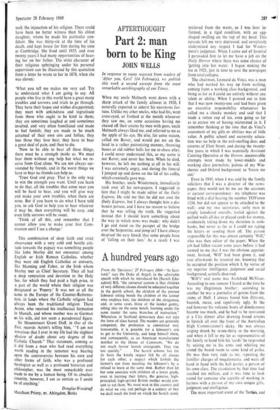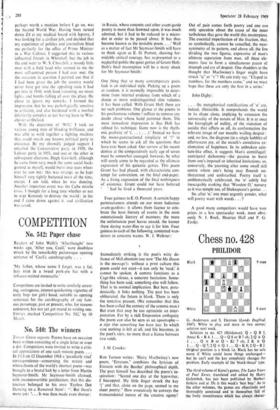Part 2: man born to be King
AFTERTHOUGHT JOHN WELLS
In response to many requests from readers of 'After you, Cecil' (14 February), we publish this week a second excerpt from the most remarkable autobiography of our Times.
When my uncle Melmoth went down with a sharp attack of the family ailment in 1920, I naturally expected to inherit his enormous for- tune. Unlike my other uncles, who had fits, went cross-eyed, or frothed at the mouth whenever they taw me, on some occasions having me chased off their estates by men with guns, uncle Melmoth always liked me, and referred to me as the apple of his eye. He also, for some reason, called me Rover, and would pat me on the head in a rather patronising manner, throwing bones or old rubber balls for me to chase after. I could never understand this, as my name is not Rover, and never has been. When he died, however, he left me nothing at all in his will. I was extremely angry, and during the funeral I jumped up and down on the lid of his coffin, which eventually gave way.
His brother, uncle Windermere, immediately took over all his newspapers. I suggested to him that I might be made editor of the Daily Express. He told me that he did not own the Daily Express, but I always thought him a dis- honest person, and I have no reason to believe that he was telling the truth. He suggested instead that I should learn something about the way in which news was made: why didn't I go and stand on the parapet of the bridge over the Serpentine, and jump in? I have always despised the easy knack that some people have of 'falling on their feet.' As a result 1 was retrieved from the water, so I was later in- formed, in a rigid condition, with an egg-
shaped swelling on the top of my head. This episode left me very depressed, and completely undermined any respect I had for Winder- mere's judgment. When I came out of hospital
I persuaded him to let me have a job on the Daily Horror where there was some chance of 'getting into hot water.' 1 began making the tea in 1921, just in time to save the newspaper from total collapse.
The chairman, Leonard da Vinci, was a man who had worked his way up from nothing, coming from a working class background, and being as far as I could see entirely without any talent or ability. When 1 pointed out to him that I was now twenty-one and had been given no executive responsibility whatsoever he called me a cheeky monkey and said that I made a rotten cup of tea, even going so far as to accuse me of having micturated in it. I remember thinking at the time that da Vinci's assessment of my gifts or abilities was of little value. A public school and university educa- tion was no help in the evil-smelling dens and caverns of Fleet Street, and during the twenty- five years in which I was nominally Assistant Catering Operative at the Horror, innumerable attempts were made by lower-middle and working class journalists, jealous of my Win- chester and Oxford background, to 'freeze me out' Even in 1945, when I was told by the family solicitors that I was a director of the news- paper, they would not let me see the accounts or current correspondence : my telephone was fitted with a dial bearing the number TOYtown 1234, but did not appear to be attached to the wall: and my two secretaries, surly men in crisply laundered overalls, loafed against the quilted walls all day or played cards for money, assiduously taking down my dictation in note- books, but never as far as I could see typing the letters or sending them off. The person responsible for this was almost certainly 'Wilf,' who was then editor of the paper. When the job had fallen vacant some years before it had seemed to me that I was the obvious appoint- ment. Instead, 'Wilt" had been given it, and ever afterwards he resented me, knowing that he occupied the position which I, by virtue of my superior intelligence, judgment and social background, actually deserved.
'Wilf's' real name was Archibald McVicar. According to one rumour I heard at the time be was my illegitimate brother: according to another he was a journalist of genius from the slums of Hull. 1 always found him illiterate, boorish, mean, and repulsively ugly. In the end however his volcanic bouts of drunkenness became too much, and he had to be restrained at a City dinner after drawing broad arrows in lipstick all over the front of the Australian High Commissioner's dicky. He was always singing drunk by seven-thirty in the morning, and when it fell to my lot as representative of the family to hand him his 'cards' he responded by seizing me in his arms and whirling me round the board room to some kind of polka. He was then very rude to me, repeating the familiar charges of megalomania, and went off hand in hand with the hall porter, a person of his own class. The circulation by that time had reached ten million, and it was time to look round for someone else capable of working in harness with a person of my own unique gifts, judgment and intelligence.
The most important event of the 'forties, and perhaps worth a mention before I go on, was the Second World War. Having been turned down Z4 at my medical board with leprosy, I was looking for a civilian job, and decided that my experience of politics and journalism fitted me perfectly for the office of Prime Minister in a War Cabinet. I suggested this to various influential friends in Whitehall. but the job in the end went to W. S. Churchill, a moody little man with a bald head who seemed to me the most self-centred person I had ever met. On the occasion in question I pointed out that if 1 had been given the job the country would never have got into the appalling state it had got into in 1940, with food rationing, no street lights, and bombs falling all over the place. He chose to ignore my remarks. I formed the impression that he was pathologically sensitive to criticism, and also burdened with a morbid inferiority complex at not having been to Win- chester or Oxford.
With the departure of 'Wilt,' I took on various young men of blinding brilliance, and was able to weld together a fighting machine that could smash any known political party in existence. By my shrewdly judged support I smashed the Conservative party in 1950, the Labour party in 1951, and one or the other in subsequent elections. Hugh Gaitskell, although he came from very much the same social back- ground as myself, would burst into tears when- ever he saw me: this was strange, as he kept himself very tightly buttoned most of the time, except, I am told, when he was dancing. Another important event was the Cuba missile crisis. I thought for a long time whether or not to urge Kennedy to destroy the world: in the end 1 came down against it. and civilisation was saved.



































 Previous page
Previous page